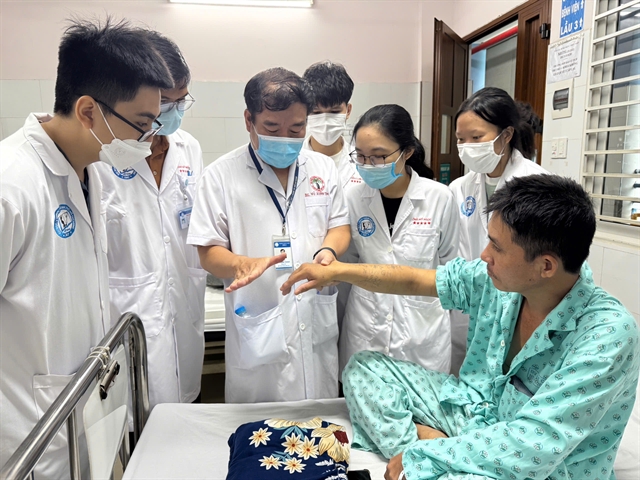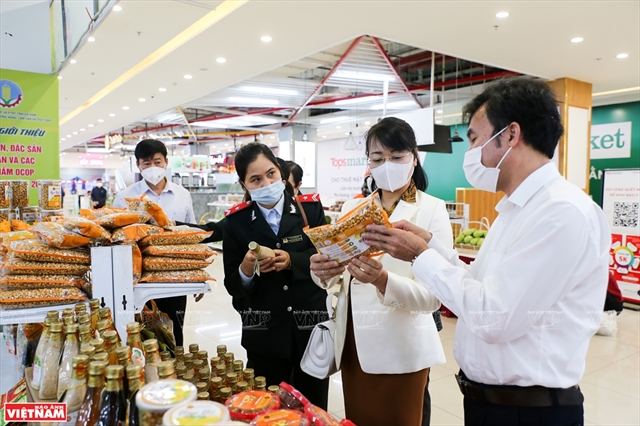 Opinion
Opinion


|
| Nguyễn Thị Thu Hằng, Director of the Hà Nội Agro-Forestry-Fisheries Quality Management Sub-Department at an agricultural products and specialties fair in northern Hà Nam Province. VNA/VNS Photo |
HÀ NỘI – Demand for food is increasing gradually before the Tết (Lunar New Year) holidays. Director of the Hà Nội Agro-Forestry-Fisheries Quality Management Sub-Department Nguyễn Thị Thu Hằng spoke with Hà Nội Mới (New Hà Nội) online newspaper about the plans on food supply to meet high demand and inspections on the quality of agricultural, forestry and fishery products sold at markets.
Could you share solutions the city will take to ensure enough supply of food products when demand increases sharply for the Lunar New Year?
With its potential and advantages of agricultural development, Hà Nội basically meets 71 per cent of the requirements for poultry products and eggs, and other agricultural and food products. Other agricultural products and regional specialty products to serve the needs of over 10 million people living, working in the city and tourists are supplied from other localities or imported.
In the past, the city has maintained and developed 159 chains of agricultural production and consumption, of that 53 are animal products and 106 are plant products.
Apart from the source of agricultural, forestry and fishery products in the city, the city’s Department of Agriculture and Rural Development and 43 localities have actively maintained and supported the development of 946 food supply chains in the city, an increase of 160 chains compared to 2015-2020.
With the current capacity, the city ensures an adequate supply of agricultural products and food for the capital's consumers, especially during the peak season of the Lunar New Year.
What has the city done to achieve the goal of creating high-quality agricultural products and food?
The city has continued to implement policies to encourage agricultural development, develop cooperation and associations in the production and consumption of agricultural products and develop high-quality and organic agricultural production areas according to the Hà Nội People’s Council’s Resolution No10/2018/NQ-HDND issued December 5, 2018.
The city has managed to maintain nearly 1,700ha of VietGAP standards cultivation area, of which 429.6ha is vegetables, 446.7ha is fruit trees, three hectares is for tea, and more than 100ha is for organic vegetable.
In order to support the development of preliminary processing and processing of agricultural, forestry and aquatic products in the city, the Agro-Forestry-Fisheries Quality Management Sub-Department has supported 95 establishments to develop an advanced quality management programme following the Hazard Analysis and Critical Control Points (HACCP), an internationally recognised system based on the production of safe food, to improve food quality and safety for agricultural product processing facilities.
It has also supported 50 businesses to build a brand identity and register for protection at the National Office of Intellectual Property under the Ministry of Science and Technology.
In addition, the sub-department has continued to apply information technology and digital technology to boost the promotion and transparency of information, origin of production and business facilities to consumers. The development of the Hanoi Agro-Forestry-Fisheries and Food Traceability System, a system of traceability for agricultural, forestry and fishery products food via the site check.hanoi.gov.vn, is an example.
More than 3,270 food producing/processing/packing and trading establishments have been given accounts to log in and update data to the system. A total of 12,286 sets of traceability codes have been granted to agricultural, forestry and fishery products that meet food safety criteria.
How has the city strengthened inspections on the quality of high-risk products such as vegetables, meat, and aquatic products sold at the market?
In order to strengthen the supervision of food quality and safety, in 2022, the sub-department has taken 1,984 samples of agricultural, forestry and fishery products sold at the markets, of which 306 samples originated from other localities.
Over 94 per cent of samples have met the analytical criteria. The sub-department has notified and issued warnings on substandard samples, traced the origin, found the cause of the violating samples and took solutions to ensure the quality and safety of food.
The city’s agriculture sector has strengthened the inspection of establishments producing and trading agricultural materials and agricultural, forestry and fishery products in the market. The city’s market watchdog has inspected 1,049 establishments and found 60 violation cases with fines of over VNĐ800 million (US$33,726).
What will be done to control the quality of agriculture, forestry and fishery products before Tết?
Safe and organic agricultural production has become an unavoidable trend, but violations of food safety still occur, especially during the Lunar New Year when the demand for food consumption increases.
The sub-department will coordinate with news agencies to disseminate legal knowledge on food safety and organise the assessment, classification and granting of certificates of satisfaction of food safety conditions, sign commitments to agricultural, forestry and fishery production and business establishments according to regulations, step up supervision and promptly detect and handle violations in order to protect consumers' interests and ensure people's health.
In order to create a source of safe and eco-friendly food, and improve product quality for export, the city’s agriculture sector is coordinating with localities to expand concentrated production associated with the application of hi-tech, ecological agriculture, organic agriculture and an advanced quality management system.
The city will invest in improving food safety and hygiene in slaughtering, preliminary processing, storing and trading in agriculture, forestry and fishery products and at the same time guide and support enterprises to expand quality and safe agricultural, forestry and fishery supply chains. – VNS